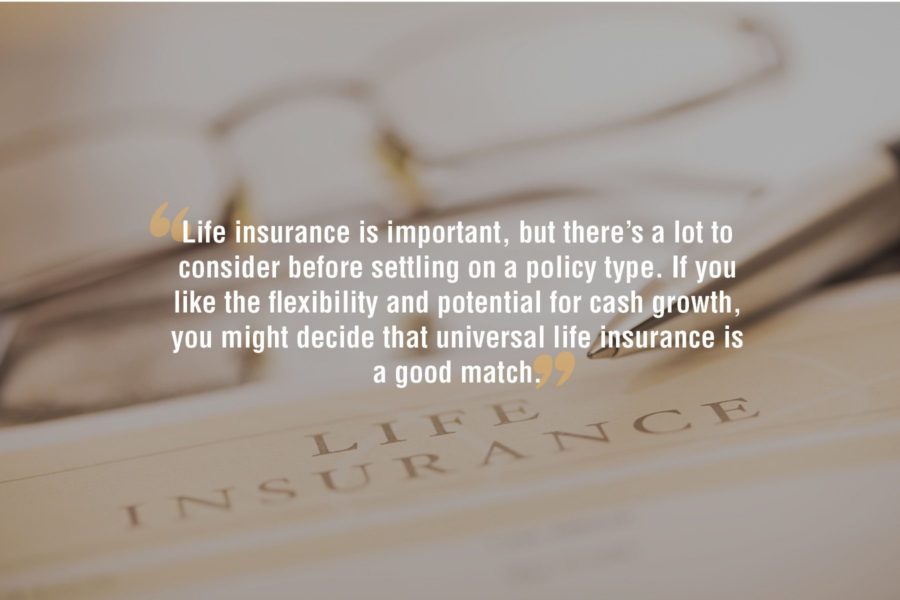Life insurance comes in many different types. One of these types is universal life insurance. Universal life insurance is a type of permanent life insurance. Unlike term life insurance, which is written to cover a specific period of time, universal life insurance can provide lifetime coverage.
Universal life insurance offers certain advantages that other types of life insurance policies do not. At the same time, there are some drawbacks and risks, and this policy type may not be appropriate for everyone.
Beyond the Death Benefit: The Cash Value
Life insurance provides a death benefit that is paid to the beneficiary upon the death of the insured. This death benefit is what most people think of when they consider life insurance. If you’re talking about term life insurance, such as a return of premium life insurance policy, the death benefit is the whole point of purchasing insurance.
Universal life insurance, however, is different. Although the death benefit is an important part of coverage for many policyholders, it is not the only element.
In addition to the death benefit, universal life insurance builds a cash value. This cash value accumulates interest, and the cash value growth enjoys a tax-deferred status. Once the cash value reaches a certain level, the policyholder will be able to access it by withdrawing funds or by borrowing from the policy. Loans are typically not taxed. If a loan is not repaid, the death benefit will be reduced.
Talk to a Life Insurance Specialist
Universal vs. Whole Life Insurance
Whole life insurance is another type of permanent life insurance. At first glance, universal life insurance and whole life insurance can seem pretty similar. However, there are some key differences, and many of these differences come down to flexibility and risk.
While whole life insurance has fixed premiums, universal life insurance has adjustable premiums. By paying more in premiums, the policyholder can build a larger cash value. Because the cash value accumulates interest that can be used to pay future premiums or withdrawn or borrowed as needed, this can be desirable.
When funds are tight, or after reaching retirement, the policyholder may be able to decrease the premiums. The policyholder may even be able to skip premium payments. It is important to make sure that the premiums are sufficient to keep the policy active, but if a sufficient cash value has accrued, the cash value can be used to cover the required premiums. With universal life insurance, the death benefit can also be adjusted. This flexibility can help the policyholder manage changing needs.
Universal Life Insurance Policy Variations
Universal life insurance is one type of life insurance, but policies aren’t all the same – there are actually different types of universal life insurance policies. These differences can be substantial, so it’s important to know what kind of universal life insurance policy you’re considering buying.
In variable universal life insurance policies, funds are tied to stocks and bonds. This can result in significant gains if the stocks and bonds perform well, but there is also a risk of loss. Indexed universal life insurance policies tie funds to indexes.
Another option is guaranteed universal life insurance. This policy type is similar to term life insurance in some ways. It is a permanent life insurance policy that provides coverage for a person’s entire lifetime, but it does not provide the flexibility (or the risk) commonly associated with other types of universal life insurance, and it may not build a cash value.
The Advantages of Universal Life Insurance
Many people consider universal life insurance to be an attractive option because it offers the following advantages:
- The policy builds a cash value that can be accessed during the policyholder’s life, for example, through a loan or withdrawal.
- The policyholder can adjust the premium payments, as long as the payments are sufficient to keep the policy in force.
- If the market performs well, the cash value will grow accordingly. This can result in substantial gains.
- The death benefit can be increased, providing a greater benefit to the policy’s heirs.
- Cash value growth has a tax-deferred status. Life insurance policy loans and death benefits are also typically tax free.
The Disadvantages of Universal Life Insurance
Although the flexibility of universal life insurance can be attractive, there are some downsides. Before purchasing a universal life insurance policy, it’s important to consider these disadvantages carefully, as some of them could result in a lapse of your policy or a reduction in benefits.
- The policyholder may need to pay various fees. Before purchasing a policy, understand the costs involved.
- Market losses may reduce the cash value. This can result in substantial losses.
- The death benefit may be decreased. This means you might leave your heirs with less than you intended.
- The policy will lapse if the premiums are not maintained and there’s not sufficient cash value to cover the missed premiums.
Universal Life Insurance Riders
Riders are clauses added to insurance policies to customize coverage. Although riders may increase the premium cost of maintaining a life insurance policy, they can also provide important benefits that would not otherwise be available.
There are many life insurance riders, and different insurance carriers have different options.
For example, some life insurance riders allow you to skip payments if you become disabled. Others allow you to draw on the death benefit early if you are diagnosed with a terminal illness. There are also life insurance riders that provide term coverage for children.
Is universal life insurance right for you?
Life insurance is important, but there’s a lot to consider before settling on a policy type. If you like the flexibility and potential for cash value growth, you might decide that universal life insurance is a good match for you. It’s important to consider the risks of the policy type, however, to avoid ending up in a situation where your policy lapses. You also need to consider what type of universal life insurance policy you might want – variable, indexed, etc. – and what riders you might want to add to your policy.
Need guidance? One of our brokers can help you determine the best policy type for your needs. Contact us today.





